

The Karnataka Story: Vocal for local
By Philip Mudartha
Bellevision Media Network
17 May 2023:
Synopsis:
According to the Election Commission of India website, the final party-wise results of the 16th Karnataka Legislature Assembly elections held on 10th May 2023 are shown below. The seats and vote share in 2018 elections are in the brackets.
1. Indian National Congress (INC): 135 seats, Vote Share: 42.88%. (80 seats, vote share 38.14%)
2. Bharatiya Janata Party (BJP): 66 seats, Vote Share 36.00%. (104 seats, vote share 36. 35%)
3. Janata Dal Secular (JDS): 19 seats, Vote Share 13.29%. (37 seats, vote share 18.20%)
4. Independents & Others: 4 seats (5.85%)
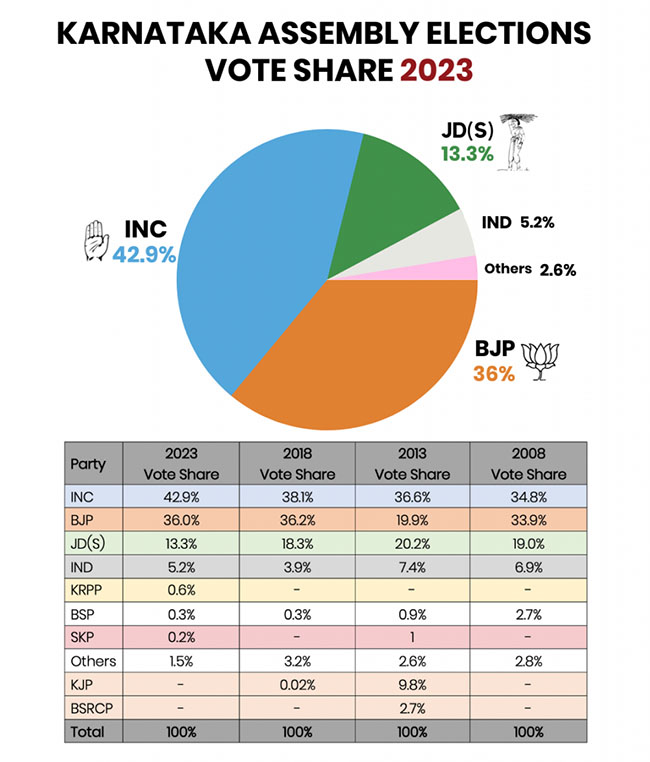
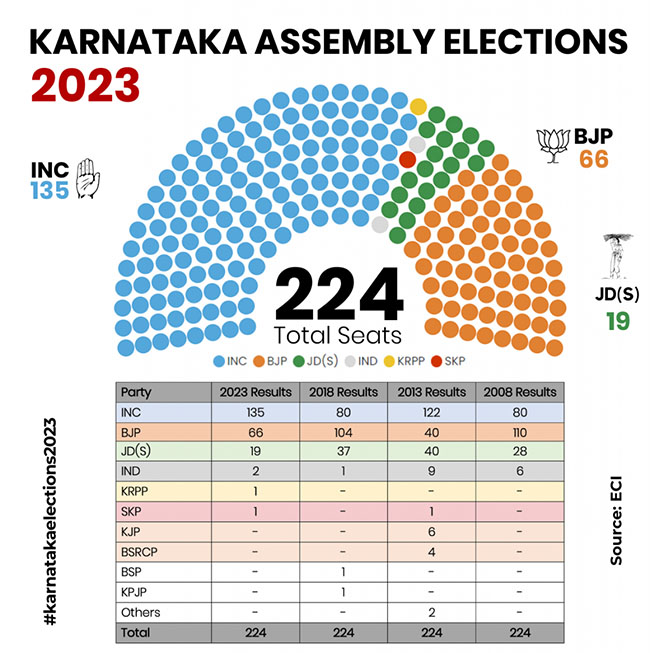
BJP may find solace that their vote share is marginally lower (-0.35%). Its core constituents have remained loyal. That is not really solace because not only BJP has lost power but the chance for its “Plan B” (of Operation Kamala) has very little chance of success.
JDS has lost 4.91% vote share and INC has gained 4.74%. The gap between INC and BJP has widened to 6.88%. It may seem that vote transfer from JDS to INC has happened. But, that may not be entirely true. Parties and political pundits will analyze region-wise, constituency-wise and even booth-level voting patterns in days to come to decipher the voter behavior.
But for now, the reality is of an unambiguous popular mandate in favor of INC to govern the state for next 5 years. BJP is entrusted the duty to be a responsible and constructive opposition. JDS, the joker in the pack as its leader HDK called his party, is neither the king nor the kingmaker. Increasingly a bipolar electoral situation is emerging in JDS’s bastion of Old Mysuru.
The INC fought the election on bread and butter issues like lack of jobs for youth, price rise especially of food staples and cooking gas, poverty, rising inequality between rich and poor and lack of development. It promised five guarantees if voted to power: Gruha Jyoti, Gruha Laxmi, Anna Bhagya, Yuva Nidhi and Shakti. The INC poll strategists designed a positive campaign to highlight their alternate narrative of running a caring and compassionate government. Their strategy struck the right chord.
INC’s slogan was “vocal for local”. Deflecting focus from PM Modi, INC managed to create enduring perception that the BJP’s state government was inept, incompetent and corrupt to the core. The “PayCM” and “40% Commission Sarkara” anti-corruption crusades delivered dividends.
Only a few weeks prior to the announcement of elections and Model Code of Conduct coming into effect on 29th March 2023, PM Modi undertook several official tours to inaugurate a slew of projects using the massive state resources. These trips were thinly disguised as official work during which Modi bent the rules to mount a political onslaught against the opposition, mainly INC. The ECI remained pliant and in awe of the PM. BJP deployed its famed money, material and muscle power secured through the opaque electoral bonds scheme to not permit INC a level playing field. Despite a high decibel and often vitriolic campaign based on Modi’s charisma, nationalism, anti-Muslim rhetoric, UCC, and Jai Bajrang Bali religious jingoism, BJP lost miserably. In fact, PM Modi lost. He was not on the ballot but inserted himself on it ignoring that it is a state election and not a referendum on him as PM.
Among the 84% Hindu population comprising half a dozen castes and dozens of sub-castes, Lingayats and Vokkaligas had dominated the politics and enjoyed plum government posts since the formation of Karnataka in 1956. These communities who make up about 31-33% of the state population are already claiming that the INC victory is due to their votes. In days to come, they will demand their pound of flesh like DyCM posts and plum portfolios, if denied the CM chair.
The Muslims (13%), Christians (2%) and Jains (1%) who together are nearly equal to Lingayat numbers and more than Vokkaligas, are excluded from political power and adequate representation in the assembly. “Ideally”, there should be 29 Muslim, 4 Christian and 2 Jain (including other) MLAs in the total strength of 224. The BJP did not field any, and INC fielded 15 Muslims and 2 Christians of whom 9 Muslims won.
The SCs are 17% and STs are 7% of state population. SCs and STs have 36 and 15 “reserved” constituencies respectively, which is commensurate of their numerical strength. It is no secret that the “creamy layer” among SCs and STs benefit electorally whichever party wins. Neither BJP nor INC are interested in “electoral reforms” through amendment to the constitution such that the minorities (Muslims, Christians, Jains, Buddhists, Sikhs and others) are treated “on par” with SCs and STs or do away with reservations altogether.
The “inadequate” women representation is another cause for concern. The BJP had fielded 12 women and INC 10. Of the 10 women MLAs elected, 4 belong to INC, 4 to BJP, 1 to JDS and 1 independent. Even these women are “wives, daughters and daughters-in-law” of prominent politicians. The “aam aurat” out there has no chance!
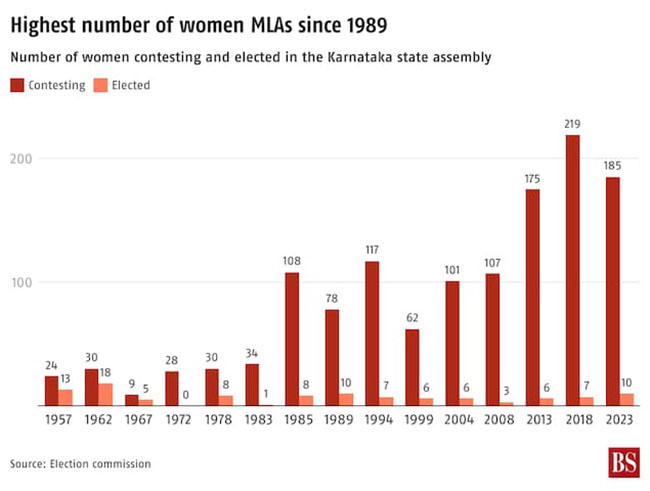
Regional Electoral Performance:
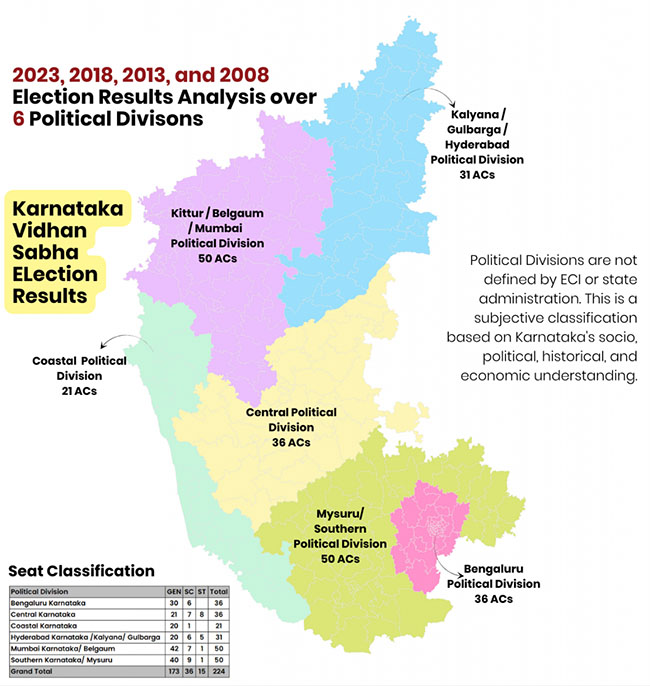
1. In Hyderabad Karnataka, INC had performed well in 2018. In 2023, INC improved its performance by increasing its seat tally from 15 to 19 and its vote share from 42.2% to 43.4%. On the other hand, both BJP and JD(S) have witnessed a decline in both seat count and vote share.
2. In Mumbai Karnataka, INC was successful in shaking the BJP’s stronghold. In 2018, BJP had emerged as the clear winner with 30 seats. However, in 2023, INC seat tally increased from 17 to 33.
3. In Central Karnataka, BJP seat share came down to 6 from 24 in 2018. INC seat tally has increased to 27 from 12. Its vote share has risen from 36.2% to 44.2%. Further, JDS vote share has declined from 14.6% to 9%. JDS has won 2 seats.
4. In Old Mysuru Karnataka, BJP increased its vote share from 18.2% in 2018 to 21.4%. INC vote share also increased from 33.8% to 39.4%. It is JDS which lost about 9% vote share, benefiting INC in seats. INC won 30 seats, an increase of 6 seats over 2018.
5. In Bangalore Karnataka, while INC held on to 18 seats, BJP increased its seats to 17 from 11 in 2018. BJP vote share increased to 41. 2% from 35.8%JDS lost 6 seats as its vote share came down to 12.3% from 20.9% in 2018. In this region, BJP and INC are in neck-to-neck competition and a bipolarity has emerged with trends emerging of BJP’s popularity among urban and richer voters. Class rather than caste and religion is likely to be the voting criterion.
6. Coastal Karnataka has long been the Hindutva hinterland where RSS and BJP have strong organizations. It is also the region where Hindu-Muslim divide works in favor BJP. In 2018, BJP secured 51% of the votes and won 18 seats of total 21. (In the twin districts of Udupi and Dakshina Kannada with 13 seats, INC had won a lone seat in Mangalore-Ullal which is its bastion. In 2023, BJP has suffered losses in both seat count and vote share. BJP’s seat tally is 13 and vote share 46.3%). INC has significantly improved its seat count from 3 to 8 and vote share from 39.2% to 41.3% in the three coastal districts. JDS is a “we-ran-too” kind of marginal player here. It is important to mention that SDPI, the electoral outfit of banned PFI, failed to win over Muslim voters who consolidated their support to INC. Udupi district, the epicentre of hijab, halal, azaan hindu khatre mein hei kind of anti-Muslim rhetoric gave all its five seats to BJP.
5 Guarantees announced by INC:
1. Gruha Jyoti: 200 units of free electricity every month to every household.
2. Gruha Laxmi: Rs 2,000 each month to the female head of every household for sustenance and help in the fight against price rise.
3. Anna Bhagya: 10 kg rice every month to every member of BPL families.
4. Yuva Nidhi: Rs 3,000 every month to every unemployed graduate for a period of two years and Rs 1,500 to unemployed youth with Diploma.
5. Uchita Prayana Shakti: Free bus travel for women in government buses to ensure that they have the freedom to travel without worrying to pay.
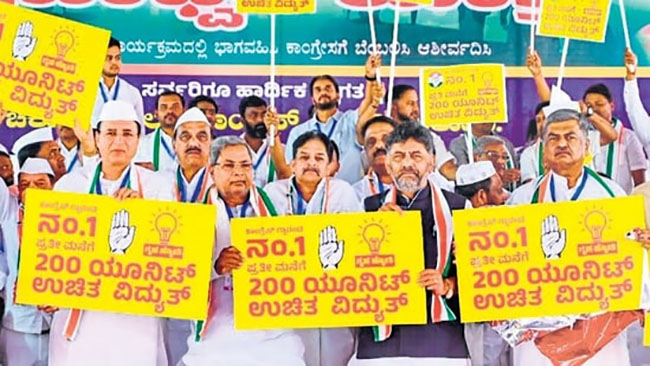
Why BJP lost:
1. Na khavoonga, Na khane doonga: After PayCM and 40% Commission Sarkara, no thinking person believes that BJP is non-corrupt. Na khavoonga, Na khane doonga is only a jumla like the 15 lakhs in everyone’s bank account!
2. Limit of BJP’s Hindutva Politics: Hate campaigns like hijab, halal, Hindu khatre mein hein, and azan have limited appeal beyond the highly polarized twin coastal districts.
3. BJP does not have strong state level leaders. BSY is 80-year old. BSB lacks the mass appeal of a sidelined BSY. BJP had to depend on “The Supreme leader” to pull off magic using his roadshows televised by Godi media owned by oligarchs in BJP camp.
4. The INC president Mallikarjuna Kharge is “Bhoomi Putra”. He achieved highly cohesive local leadership with both Siddaramaiah and DKS putting their rivalry on back burner until the bigger goal of INC victory is achieved. BJP on the other hand came a cropper and seemed to be a divided house.
5. INC assembled a formidable rainbow coalition of castes and classes. INC was ahead in Lingayats dominated seats, it was ahead in Vokkaligas dominated seats, it was ahead in Muslim dominated seats, it was ahead in SC reserved seats and it was a clean sweep in ST reserved seats. INC had to win since it had dominance among the poor and lower middle class which classes are a majority in the state.
6. Women voters preferred INC over BJP in larger numbers. The 5 guarantees of INC may have worked as the magnet for women voters.
Lessons taught by Karnataka Voters:
1. Hindu-Muslim polarization politics doesn’t work every time and everywhere, especially in South India. That is why, after Karnataka 2023 elections, Dakshin Bharat is BJP-mukht.
2. Welfare and development agenda are very important to woo voters. Communal agenda is not enough. Bashing seculars and liberals as anti-national, and opposition party leaders as members of tukde-tukde gang is counter-productive. Look at C.T. Ravi and B.C. Nagesh, the fire-breathing hardliners of BJP. They have lost in their pocket boroughs!
3. Modi magic will not work in state elections. Delhi NCT in 2015 and 2020, West Bengal in 2021, Punjab in 2022, other South Indian states like Kerala, Tamil Nadu, Telangana, Andhra Pradesh have rejected BJP in state elections. Earlier, even Rajasthan, Madhya Pradesh, Chhattisgarh, Jharkhand, Bihar and Maharashtra have elected non-BJP parties to govern at state capitals. Recently, Himachal Pradesh also voted in favor of INC.
4. BJP can be defeated. Modi is not invincible. With a positive narrative, even a party without a lot of money and muscle power can defeat a rich party like BJP.
5. The constitutional institution ECI was pliant and biased in favor of BJP. It issued show-cause notices only to opposition parties and not to BJP. The central agencies, ED, CBI, DRI took orders from their political masters in Delhi and as ‘caged parrots’ bent ackwards to raid leaders of opposition parties, especially of INC. Yet, BJP and Modi were defeated.
6. “For Great people, religion is a way to make friends. Small people make religion a fighting tool”. APJ Abdul Kalam, whom NDA led by AB Vajpayee chose as President of India had famously said. The BJP of Modi-Shah-Nadda, unlike that led by ABV, is a ruthless election fighting machine bereft of morality. Karnataka voters have shown them the door for a good reason.
Is Ban Bajrang Dal a Fiasco?
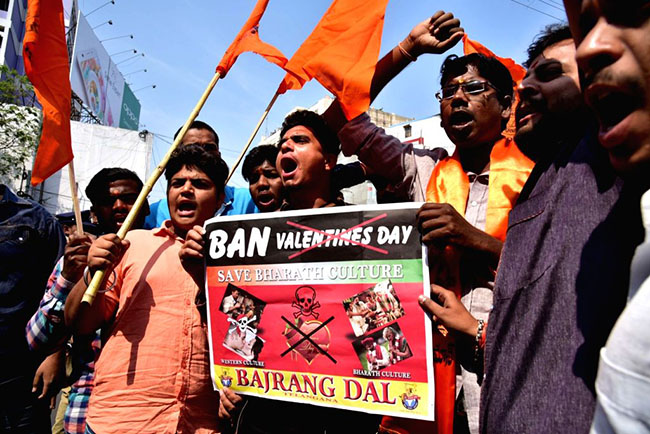
Many TV Anchors, journalists and opinion-makers have reported that INC scored a “self-goal” by hinting at imposing a ban on radical outfits such as PFI and Bajrang Dal (BD). Non-BJP voters in Udupi and Dakshina Kannada have felt that Hindus may have rallied behind BJP candidates. INC candidates like Sorake in Kapu, Poojary in Karkala and Lobo in Mangalore South lost out due to the BD ban fiasco. I disagree with that assessment. The margin of loss of these INC candidates is more than 10%. The swing among Hindu voters due to the BD ban fiasco is unlikely to be more than 3-4%. On the contrary, the Muslim voters in these constituencies have dumped SDPI and JDS in favor of INC.
The Tussle for CM Kursi:
The rivalry between Sidaramaiah and DK Shivakumar is well-known. Both had made their desire to be CM even before the elections. As soon as INC got the thumping majority of 135 seats (plus 2 counting 2 MLAs supported by INC), the race for the CM chair intensified. At the time of writing, the tussle is not yet resolved. The MLAs in their meeting held on 14th May 2023 have voted through secret ballot. The ballots were not counted and published in Bangaluru. Instead, they were carried to Delhi for examination by the “High Command” (Kharge) in presence of senior leaders including Gandhi Family members.
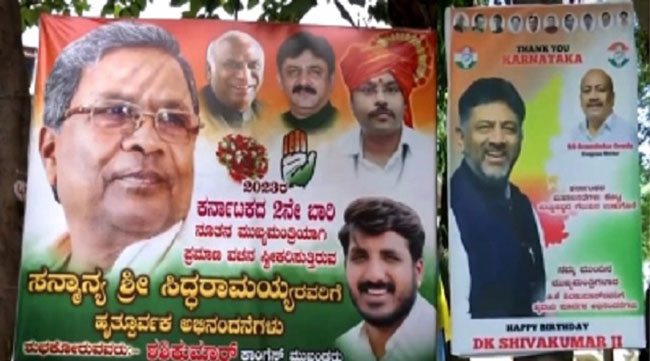
This is a democratic process unlike the process BJP follows in the Modi-Shah era. The “High Command” of BJP is very authoritarian. It is like “High Command” of INC during late Indira Gandhi. The present “High Command” of INC is weak and therefore more democratic, consultative and accommodative. A resolution of the tussle will emerge sooner than later, possibly by the time you will be reading these lines.
However, it must be said that INC leaders in the state should keep their eyes and ears close to the ground realities if they should not suffer the fate of Kamalnath in Madhyaa Pradesh and Uddav Thackerey in Maharashtra.